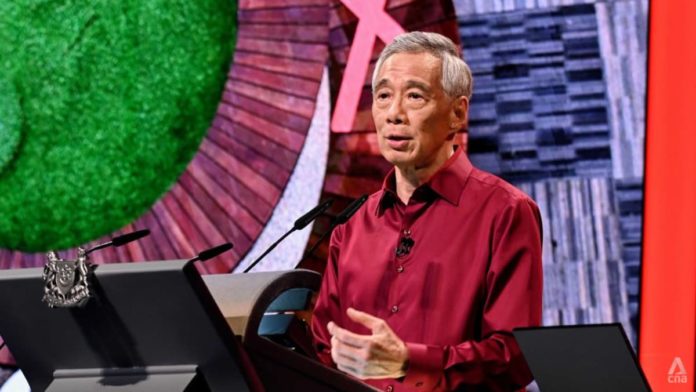
A major issue for gay Singaporeans is Section 377A of the Penal Code, which makes sex between men a criminal offence. It was originally introduced in the 1930s by the British colonial government. It reflected moral attitudes and social norms that prevailed back then. But over the decades, homosexuality has become better understood, scientifically and medically. In many societies, including Singapore, gay people have become more accepted for who they are, instead of being shunned and stigmatised.
Many countries that used to have laws against sex between men have since repealed them. They include several Asian countries, but so far not Singapore.
Parliament last debated whether or not to repeal Section 377A in 2007. MPs expressed strong views on both sides. I joined in the debate to advise restraint and caution. I acknowledged that what consenting adults do in private is their personal affair, and the Government should not intervene. But I pointed out that not everyone was equally accepting of homosexuality. Quite a few had considerable reservations, particularly within certain religious groups, including the Muslims, Catholics and many Protestant denominations. The Government decided then that we would leave S377A on our books, but not actively enforce it. We stopped short of repealing the law. It would have been too divisive to force the issue then. It was better for us to live with this untidy compromise, and it was a practical way to accommodate evolving societal attitudes and norms in Singapore. The compromise did not satisfy every group but by and large, it has enabled all of us to get along. And so, we have lived with this sensitive issue, without it monopolising our national agenda or dividing our society.
Now, 15 years later, attitudes have shifted appreciably. While we remain a broadly conservative society, gay people are now better accepted in Singapore, especially among younger Singaporeans. It is timely to ask ourselves again the fundamental question: should sex between men in private be a criminal offence?
Singaporeans still have differing views on whether homosexuality is right or wrong. But most people accept that a person’s sexual orientation and behaviour is a private and personal matter, and that sex between men should not be a criminal offence. Even among those who want to retain S377A , most do not want to see it actively enforced, and criminal penalties applied. From the national point of view, private sexual behaviour between consenting adults does not raise any law-and-order issue. There is no justification to prosecute people for it, nor to make it a crime.
Furthermore, we have seen several court challenges to S377A, seeking to declare the law unconstitutional. None have succeeded, so far. However, following the most recent judgement in the Court of Appeal, the Minister for Law and the Attorney General have advised that in a future court challenge, there is a significant risk of S377A being struck down, on the grounds that it breaches the Equal Protection provision in the Constitution. We have to take that advice seriously. It would be unwise to ignore the risk, and do nothing.
For these reasons, the Government will repeal S377A and decriminalise sex between men. I believe this is the right thing to do, and something that most Singaporeans will now accept. This will bring the law into line with current social mores, and I hope, provide some relief to gay Singaporeans.
But at the same time, most Singaporeans do not want the repeal to trigger a drastic shift in our societal norms across the board, including how we define marriage, what we teach children in schools, what is shown on free to air television and in cinemas, or what is generally acceptable conduct in public.
In our engagements and soundings over several months, this has come through very clearly. Among those with reservations, some feel strongly about S377A itself. But for most, their main worry is what they feel S377A stands for, and what they fear repealing it may quickly lead to. They also worry that this may encourage more aggressive and divisive activism on all sides. This is not only the concern of those with religious objections, but is shared by many non-religious people. Even many Singaporeans who support repeal want to maintain our current family and social norms.
The Government understands these concerns. We too do not want the repeal to trigger wholesale changes in our society. We will maintain our current family-oriented approach, and the prevailing norms and values of Singapore society.
Hence even as we repeal S377A, we will uphold and safeguard the institution of marriage. Under the law, only marriages between one man and one woman are recognised in Singapore. Many national policies rely upon this definition of marriage – including public housing, education, adoption rules, advertising standards, film classification. The Government has no intention of changing the definition of marriage, nor these policies.
However, as the law stands, this definition of marriage can be challenged on constitutional grounds in the courts, just like S377A has been challenged. This has indeed happened elsewhere. If one day such a challenge succeeds here, it could cause same sex marriages to become recognised in Singapore, and this would happen not because Parliament passed any such law, but as the result of a court judgement. Then, even if the majority of MPs opposed same sex marriage, Parliament may not be able to simply change the law to restore the status quo ante. Because to reverse the position, Parliament may have to amend the Constitution, and that would require a two-thirds majority.
I do not think that for Singapore, the courts are the right forum to decide such issues. Judges interpret and apply the law, that is what they are trained and appointed to do. To interpret the law, what does the law say; to apply the law, how does it work in this instance. But judges and courts have neither the expertise nor the mandate to settle political questions, nor to rule on social norms and values because these are fundamentally not legal problems, but political issues.
This has been wisely acknowledged by our courts in their judgments dealing with such cases. But even so, those seeking change may still try to force the pace through litigation, which is in its nature adversarial. It would highlight differences, inflame tensions and polarise society, and I am convinced, this would be bad for Singapore.
We will therefore protect the definition of marriage from being challenged constitutionally in the courts. The legal definition is contained in the Interpretation Act and the Women’s Charter. We have to amend the Constitution to protect it, and we will do so.
This will help us to repeal S377A in a controlled and carefully considered way. It will limit this change to what I believe most Singaporeans will accept, which is to decriminalise sexual relations between consenting men in private. But it will also keep what I believe most Singaporeans still want, and that is to retain the basic family structure of marriage between a man and a woman, within which we have and raise our children.
What we seek is a political accommodation, one that balances different legitimate views and aspirations among Singaporeans. For some, this will be too modest a step. For others, it will be a step taken only with great reluctance, even regret. But in a society where diverse groups have strongly held opposing views, everyone has to accept that no group can have things all their way. If one side pushes too hard, the other side will push back even harder. In some Western societies, not few, this has resulted in culture wars, contempt for opposing views – not just for their views but for the opposing people, cancel culture to brow beat and shut up opponents, and bitter feuds splitting society into warring tribes. There are some signs of similar things starting to happen here too. I say, let us not go in this direction. All groups should exercise restraint, because that is the only way we can move forward as one nation together.
There is much more to be said on this difficult subject. I am sure what I have said tonight will set off further reactions and discussions, and we will have a full debate when we bring the legislation to Parliament.
But tonight, I wanted to set out our broad approach on this issue. We have a stable and generally harmonious society, and we will work hard to keep things like this. I hope the new balance will enable Singapore to remain a tolerant and inclusive society for many years to come.
Securing our Future
While we deal with sensitive issues like S377A, please remember that it is not the only subject on the national agenda, we have many other important matters to deal with.
The 4G team are gearing up for the next chapter of the Singapore story. Recently, DPM Lawrence Wong launched Forward Singapore. The conversation is to build consensus on the kind of Singapore we want to see. We want to meet the enduring aspirations of every Singaporean, including a good start in life, regardless of background; affordable housing and childcare when you get married; opportunities to upgrade yourself throughout your career; and a healthy and fulfilling retirement in your golden years. How can we achieve this, into the next generation? What specific goals should we set for ourselves? What do we need to do, what trade-offs do we have to make? How can we rally everyone to realise our shared vision? This is what the Forward Singapore conversation is about.
I hope that through this exercise, we will better appreciate some enduring imperatives for Singapore:
First, we must take pride in being Singaporeans, strengthen our national identity, and understand where our national interests lie. Our ethnic cultures and religious traditions are an important part of our identity, but first and foremost we are all Singaporeans together. There will always be external forces pulling us in different directions. Singaporeans are being exposed to all sorts of persuasion and propaganda, misinformation and agitation, not least on social media and messaging apps, more so in a world riven by rivalries and tensions, with countries coming under pressure to support one side or the other. We need a strong sense of national identity to hold us together, and give meaning to our nation building. We are Singaporeans, and that is why we will never stop working together to build a home that we are all proud of.
Second, we must stay open and connected to the world. Globalisation is on the wane, and countries are turning inwards and protectionist. But Singapore is still a global city. We cannot survive in any other way. It is impossible for us to grow or make everything we need ourselves. Nor can we consume everything we produce, whether computer chips or pharmaceuticals or petrochemicals. To make a living, we will always require foreign investments, overseas markets, and excellent transport and communications links with all parts of the world. The international tensions and uncertainties make our task harder but countries will still do business with one another; MNCs will still look for places to invest; the world will still need financial centres, and communication and transportation hubs. If we are nimble and enterprising, we will get our share of these and more.
Third, we must build a world-class talent pool in Singapore. We do our utmost to develop our own talent, and enable every Singaporean to reach their fullest potential. But when it comes to top talent, we can never have enough. This is an age where talent makes all the difference to a nation’s success. We need to focus on attracting and retaining top talent, in the same way we focus on attracting and retaining investments.







